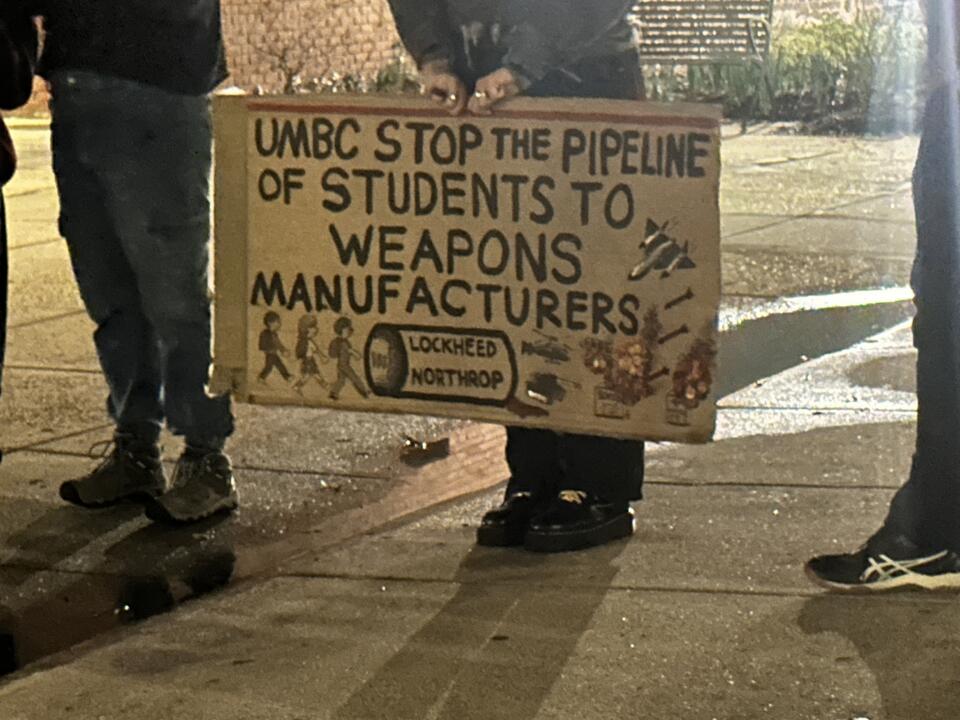While the University Center at UMBC is typically a hub of academic relations, every Monday and Thursday it turns into an overnight fortress for the student organization Humans vs. Zombies.
The group, a large conglomerate of students from a variety of backgrounds and majors, meets every Monday and Thursday night at 7 p.m. to engage in “missions.” There are only two teams: humans and zombies. The zombies – the offensive attackers – are “infected” individuals who are attempting to tag the humans and contaminate them. The humans are attempting to survive and complete objectives, armed with an array of nerf blasters to defend themselves. A single shot stuns the “zombie” and forces them to freeze for a short period of time.
“The humans usually have the more complicated job. They have the blasters and they have to go around completing various objectives, whether it is to hold an area for a set amount of time, maybe grab one of our mods and escort them along a set path. Frequently we have bottles that we hide around campus and the humans have to go find a set number of them,” said Humans vs. Zombies president, Zachary Murray.
The margin of error for the humans is also comparatively smaller. “If [you are a zombie] and you tag a human, they’re dead and they become a zombie,” he added.
The group could be seen engaging in said missions near the University Center on Monday, April 17.
The concrete building – three stories tall with a large balcony wrapped around the second floor overlooking the student walkway below – is perfect for strategic planning and surprise attacks. The UC is flanked on each side by outdoor staircases that lead to the second floor-balcony.
Around 7:30 p.m., a lone student with a white bandanna wrapped around his neck signaling his status as a zombie, stealthily climbed the left staircase, hugging it tightly so that the opposing humans on the balcony above might not be able to see him.
The zombie was sorely mistaken.
Two armed humans were watching the zombie as he approached. One had a nerf rifle the size of an average AK47 and the other had a slightly oversized nerf pistol. As the zombie got closer to the top of the staircase and the platform, the human with the pistol leaned over the rail of the balcony and fired two bullets in rapid succession, each finding their target.
The humans quickly began to gather in numbers around the top of the staircase, rounding up zombies who were temporarily stunned.
“How much time in the hull?” one of them asked.
“Two minutes,” came the response of a human.
Crossfire suddenly ensued and bullets began flying as more zombies arrived on the scene. “Oh fuck!” shrieked the stunned zombie who had asked the question moments ago. He clawed at his eyes.
“You okay?” someone asked.
“Yeah, sorry. My glasses were down just a little bit and he literally threaded the needle right here,” he said, pointing to the gap between the edge of his glasses and the top of his eye. “But yeah I’m good. I can play with one eye.”
Each participant has their fair share of war stories to tell, Murray said.
Chase Potter, recruitment officer, said, “I got left in a designated area that we had for our final [mission], and I got left there while the rest of the humans went to go find the last bottle so we could start. I got left alone and there was like 17-20 zombies around me. I ended up dying but it was great for me because I’m normally inconsistent and I went 13 for 14 on shots before I was killed and I actually took out a vast majority of them.”
Murray added one of his own. He prefers being a zombie because it involves more exercise and it does not come with the paranoia of being hunted. He added that he particularly enjoys hiding amongst the holly bushes on the back side of UC because he is always wearing long sleeve shirts and pants, and no one else is willing to go in the spot.
“A group of humans walked past and I kind of slipped out and walked with them for three to four seconds, tagged about five of them before they even realized I wasn’t a human, and then they were just kind of questioning where I had come from,” he recalled.
The group has been operating officially at UMBC for eight years now, sustaining itself not only by advertising through various online mediums, but also from simply playing in a public area full of students and prospective members, according to Potter.
“This semester we were playing a game and we had three to four different people come up because they saw us playing in the middle of the day and were like ‘hey what’s going on, this looks like fun’ so yeah, it’s great for advertisement.”
He added, “Just being out there and playing is a really good way to show people [that] this is fun and you want to be a part of it.”

